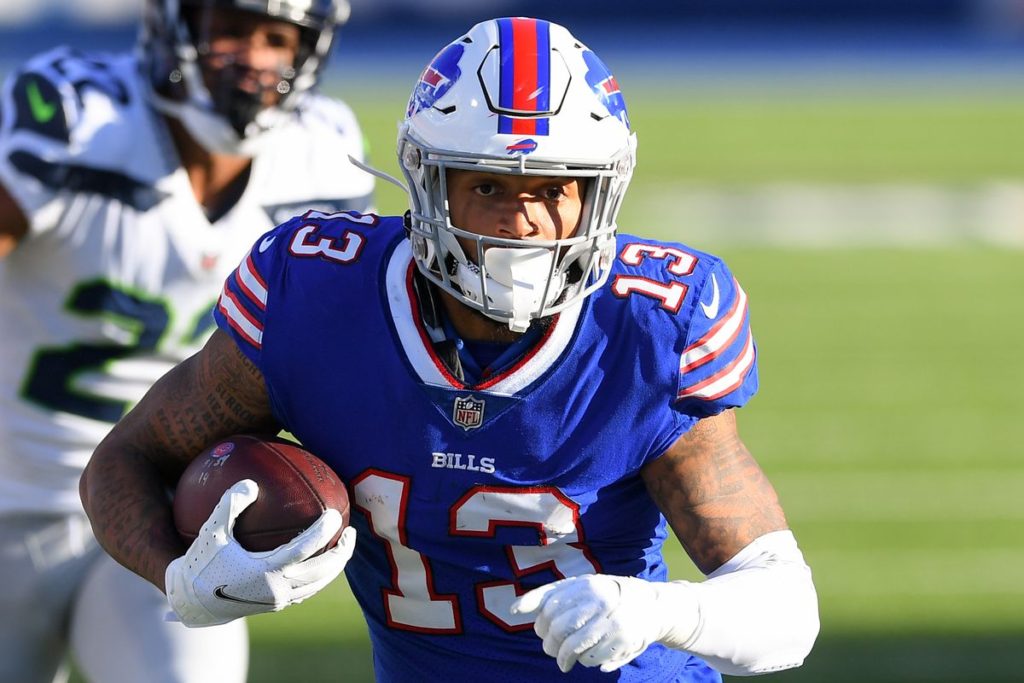4-EYED DYNASTY TARGET: Gabriel Davis

As a fourth-round pick in the 2020 NFL draft (and a late pick in dynasty rookie drafts), expectations for Gabriel Davis entering this past season were not very high. However, Davis performed well and was increasingly utilized as the season progressed. While the offseason buzz surrounding him may not make Davis a “buy low” candidate anymore, he is certainly someone worth targeting this offseason.
Background
Davis is not a burner (4.54 40-yard dash time and 103.1-speed score, according to Player Profiler – both slightly above average), but has good size at 6’2” and 216 pounds and a knack for getting open with good route running and target separation. His college dominator rating (34.4%) from the University of Central Florida was not elite, but he had a good breakout age of 19.4. Davis’ overall situation with the Buffalo Bills is a good one, and his production profile from a solid, if unspectacular, rookie season shows promise.
Current Situation
Davis is tied to a rising star at quarterback in Josh Allen and plays in a pass-heavy offense which bodes well for his fantasy upside. In the 2020 season, the Bills were in the top half of the league in pass attempts and the bottom half in rush attempts. They also ranked second in overall team offense and points scored. Pro Football Focus graded Buffalo’s pass offense at 87.7, good for sixth in the league. The offense is led by Allen, who, under the tutelage of offensive coordinator Brian Daboll, took a step forward as a passer in 2020. Allen improved across most major statistical categories, including completion percentage, touchdown percentage, and passer rating. According to Fantasy Data, he was fourth in the league in air yards per game and in the top-10 in deep-ball completion percentage, which correlates well with Davis’ average target distance of 15.1 yards. While much of the dynasty community adheres to the adage that talent trumps situation, situation matters — and in Buffalo, Davis’ situation is promising.
Given the opportunities in that situation, Davis performed well in 2020. While only targeted 62 times, he averaged 17.1 yards per reception (599 yards on 35 receptions) and cashed in on seven touchdowns. While 35 receptions is only 56.4% of his 62 targets, Fantasy Data’s true catch rate — which divides receptions by catchable targets — was 76.1% for Davis. He should be able to improve on that number with experience. Davis led the team in target separation, meaning he is getting open when the ball is coming, which can only help his production.
Fantasy Relevance
According to Fantasy Data, on the season, Davis was WR54 in FanDuel scoring, with 119.4 fantasy points (and WR70 with 7.5 fantasy points per game). That may seem like a modest result, but given the underlying statistics like average target distance and snap share, John Brown’s departure, and the Bills’ overall offensive and quarterback situation, the arrow is pointing up for Davis, who turns only 22 on April 1 of this year. Given Buffalo’s team needs in other spots, they probably will not spend much draft capital on a receiver that would mitigate Davis’ potential. A 2021 finish in the top-36 wide receivers is not outside the realm of possibility. As a trade target, Davis is probably worth an early second-round rookie pick in a .5 PPR Superflex format, and maybe even a late first in a 1QB league.
Outlook
With John Brown, his main competition for deep balls in 2020, struggling to stay on the field, Davis saw a 73.4% snap share, good for second on the team among wide receivers, behind only Stefon Diggs and ahead of Cole Beasley. He is on the field and running routes, which is the first ingredient in improved fantasy output. Brown has now departed for Las Vegas, replaced only by veteran depth piece Emmanuel Sanders, who should not pose much of a threat to Davis’s workload, in my opinion.
With Beasley aging and Diggs commanding so much attention from defenses, Davis should play a bigger role on the offense moving forward. Furthermore, Davis was trusted more as the season progressed, with 43.5 percent of his targets coming in weeks 13-17 alone, including an eight-target game in Week 14. Allen grew more comfortable looking Davis’ way, and with what we hope is a true full slate of OTAs, training camp, and preseason games this year, that chemistry should only improve, and Davis’ fantasy production should increase.
